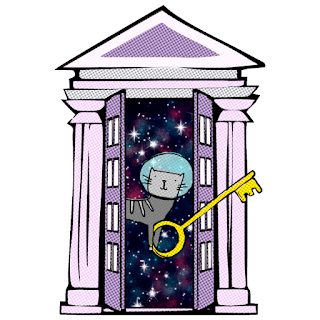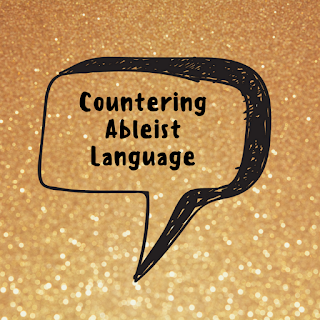 |
| Accessibility series logo |
Asher is a public librarian in New York City and they have a passion for reference work of all kinds. They are neurodivergent (ADHD, and learning disabled: nos), chronically anxious, and chronically ill and aren't afraid to talk about any of it. They believe education is fundamental and work hard to combat stigma against disabilities.
CW: For the use of slurs (particularly the r-slur and mental health related slurs) and a discussion of hurtful ableist language.
I find that ableism is something most of the neurotypical and non-disabled people I work with have never heard of. I find that even co-workers who fit within the various disabled and neurodivergent categories don't understand what it means or how it works. Particularly, there are a lot of misunderstanding about the realities and consequences of ableist language.
Ableist language is insidious, nasty, and ingrained into so much of our everyday discourse that it can be difficult to begin rooting out. Disabilities, and thus disabled people our/themselves, are often the butt of jokes. Words like “insane” and “psycho” are solidly entrenched as appropriate adjectives to use when discussing people or situations that seem abnormal or even just annoying. Individuals without mental health issues or learning disabilities may jokingly claim these identities when owning up to perceived mistakes or irregularities. The normalization of casual ableist speech is so pervasive that I catch myself engaging in it as well, for all that I'm disabled and neurodivergent myself.
It is important to steadily counter this perceived norm, particularly within the library, as we are often seen as authority figures, or educators. Not only that, libraries are billed as welcoming for all people, we should be mindful not to exclude people by careless language use. What follows are some examples of ableist conversations that I find myself repeatedly running into in the library, and how I counter hurtful “jokes” and slurs while educating against their use.
 |
| image description: a gold glitter background with a sketched text bubble on it. Inside the bubble writing reads "Countering Ableist Language" |
Here's an imagined conversation on confronting the use of slurs; I consider this a positive outcome:
Coworker: "Why did he do that? That's so retarded!"
Me: The r-word is not an appropriate word to use, it's a really insulting and hurtful slur.
Coworker: Oh! I'm sorry, I won't use it again. -rephrases the statement to something like "Ugh, why is he acting so ridiculous"-
Instead, when I ask people not to use the r-word or other slurs, I encounter a lot of defensive justifications such as, "I don't mean anything by it!" Occasionally, people will tell me "Well, I won't use it around you again," which isn't my desired outcome (an end to slurs, period, would be better). Most of the time these individuals forget and continue to use the r-slur in my presence. Continuing to challenge the use of ableist language in the workplace is a drain on my energy and spoons, but I keep speaking up even against repeat offenders.
I find that direct and quiet confrontation is the best way to address ableist language. Be clear when calling out slurs as slurs, tell the person who used the word that is is a slur directly. I don't care if I sound like a broken record; sooner or later, my repetition will click. Even if colleagues continue using ableist language outside of my earshot, maybe my voice will echo in the back of their heads.
Here are other conversations I have encountered in the workplace:
Coworker: I'm so OCD! I can't stand to see that mess.
Me: Oh! I don't want contribute to any triggers, can I help organize things to alleviate the situation?
Coworker: I'm so ADHD, oh look a squirrel!
Me: I have ADHD, it can be really stressful when you can't focus. Is there anything I can do to help?
I don't ever want to assume, when a person makes a statement like the ones above, that they are or aren't neurodivergent. So I treat comments like that seriously; I don't act like it's a joke, because it's not a joke. Sometimes this approach startles people, and they stammer, "oh, no, I don't really have..." to which I respond along the lines of, "it would be okay if you did. In the future, you shouldn't joke about things like that."
As a side note, if you do choose to disclose that you are disabled or neurodivergent and someone responds with, "oh! You don't seem like it," that response is ableist too. If you can, call them out. You could say, "Disabilities don't seem like most things people expect them to." Or, "There is no set way for any one person to look/act." My personal response, to people telling me I don't seem like I have learning disabilities is to say, "I spend a lot of time and effort not letting it affect my work. To tell me I don't seem learning disabled diminishes my effort and insults me." However, your mileage may vary for what you are comfortable stating and sharing. It is never the disabled or neurodivergent individual's responsibility to confront ableism they meet. Nor educate those who do not know better. Your wellbeing comes first, whether that's addressing ableist language heads-on or not responding to maintain your own level of safety and spoons
Finally, here is one of the most common situations I run into within libraries.
Coworker: That patron is psycho!!
Me: I wouldn't use the word psycho because that's not really appropriate. The patron /they were really aggressive/was very difficult to work with/other counter.
Alternatively: We can't diagnosis anything about a person, I know they are difficult to deal with, maybe we should work on a plan to deal with their behavior.
I work in a location near a shelter for people who have mental health concerns and encounter some variation of the above conversation on a consistent basis. It became such a problem, that I brought it up during a staff meeting. You could go directly to your supervisor and talk frankly about the issue. If your workplace offers training on mental health first aid, take it, encourage your co-workers to take it as well.
Communication and education is exhausting, and I don't always have the spoons to deal with it, but when I do, I speak up. If you also have the energy, I encourage you to call out ableist language and actions at work. Repeatedly. Take the issue to management if you need to, especially if this seems like a wider-reaching problem than just a few conversations with coworkers. If you are in management, offer training and resources to your staff. Prioritize making your workplace free from ableist language for both employees and our patrons
For additional reading, please see the following:
Ben-Moshe, L. (2005). "Lame idea”: Disabling language in the classroom. Building pedagogical curb cuts: incorporating disability into the university classroom and curriculum, 107-115.
Brown, L. (2014, February 11). Violence in language: Circling back to linguistic ableism . In Autistic Hoya. Retrieved from http://www.autistichoya.com/2014/02/violence-linguistic-ableism.html

No comments:
Post a Comment